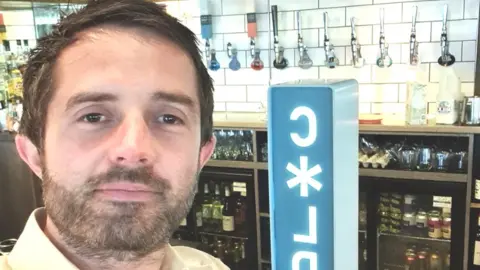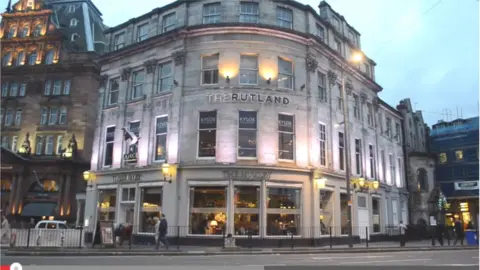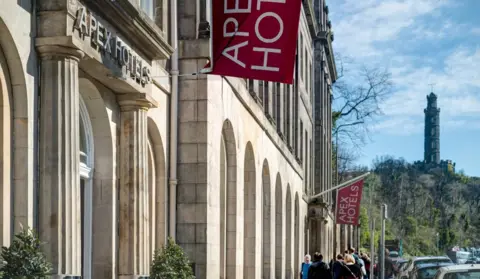Covid: 'The horror of laying everyone off made me sick'
 Rabbie’s Trail Burners
Rabbie’s Trail BurnersEarly last year, the future looked bright for coach tour operator Robin Worsnop.
The chief executive of one the UK's largest small group tour businesses was planning to add 30 staff to his 246-strong workforce as he prepared for the 2020 season.
But his world was about to crash.
When lockdown was imposed in March, he lost almost overnight his international visitor market - a core part of his business.
Mr Worsnop estimates that his company, Rabbie's Tours, lost millions of pounds in revenues last year, with income down by more than 90% on 2019.
It forced him to confront the unthinkable - shutting down a UK-wide business he had built up from his Edinburgh base over decades.
'Sleepless nights'
He openly admits that the pandemic took a heavy toll on his mental health.
"The month of March was the most harrowing of my business career as I faced the immediate prospect of saying goodbye to everything I had built up over 28 years," he explains.
"The sleepless nights and stress and day-by-day reworking and reformulating business plan after business plan, based on a few words here and there from government ministers.
"It took an immense toll on my mental health and I lost 10kgs in that month alone.
"Admittedly I am now a better weight, but I also started chain-smoking."
 Rabbie’s Trail Burners
Rabbie’s Trail BurnersHe said he had been in "the depths of despair" - but was kept going by his family and the team around him.
"The horror of laying everyone off and putting them in penury made me physically sick," he said.
"But the support I got from both my management team and words of encouragement from many frontline team members convinced me I had to try and save Rabbie's."
Things were to improve as the UK government furlough scheme kicked in at the end of March 2020, allowing Rabbie's to retain 190 staff.
But he says that the past year has been "incredibly challenging" for both him and his workforce, whom he describes as a "clan".
'Incredibly hard work'
"There have been some very dark days over the last year and motivation levels can be sapped very heavily.
"I know that I have suffered from these things so I can only imagine members of the team have been feeling the same way."
However, Mr Worsnop remains optimistic about the future as restrictions are gradually lifted.
"I cannot say losing the millions of pounds we have over the last year has been enjoyable and we've got an awful lot of incredibly hard work to build back the business so it is financially robust again.
"But I look forward to doing that and making the business even greater than it was before."

The lockdown has also been tough for managers like Simon Round, who runs the Huxley bar and restaurant in Edinburgh.
He spent a total of 10 months in furlough over the course of the pandemic, and only returned to his workplace full-time four weeks ago.
He says furlough came as a shock.
"I needed to keep active and fit to stay positive, as I live by myself and lockdown at times was really tough," he said.
His employer, Signature Pubs, set up social media groups to help motivate Simon and his team to remain active.
'Quite intense'
Staff were also encouraged to take part in quiz nights and post videos to the staff pages.
But returning to work also presented its own challenges.
"Myself and most of the team have gone from not seeing any people to serving hundreds of guests on a single day, so that alone can be quite intense.
"It's also difficult for guests, who are having to get used to going out and about socialising again."
 Signature Pubs
Signature PubsSimon admits that he still facing challenges as he continues to re-acclimatise to his work environment.
"I personally have suffered with my mental health, and anxiety will come and go, but I tackle it by talking it out and staying active," he explains.
"The best thing I have ever done is take up running and playing lots of golf - badly.
"Being around alcohol all the time can lead to you wanting to drink more yourself, and even though I do love a day/night out at the pub, the next day can sometimes be quite tough with anxiety."
Companies and trade bodies across a range of sectors are already placing greater emphasis on mental health in the workplace for managers, as well as staff.
In tourism and hospitality, for example, there is growing concern that a crisis is looming, with many businesses still on government lifeline support, grants and loans.
 Apex Hotels
Apex HotelsRobert Allan, HR director of the Apex hotel chain, says measures to develop mental health support services are "a crucial component of the industry coming back strongly".
He says companies should be "extremely mindful" that line managers, heads of department and supervisors may need support.
"Many will have been playing their part in supporting companies through the past few months, which in reality may add to their own challenges," he says.
Hospitality Health, a charity which supports people working in the sector who are "experiencing tough times", agrees that the pandemic has been hard on managers as well as staff.
Founder Gordon McIntyre explains: "Overnight they had to close the business and either make staff redundant or thankfully consider furlough, a better option at the time.
"The situation caused an immediate rise in stress, anxiety and in several cases depression.
"For staff it was the fear of the unknown. Would they keep their job? Would they be on a lesser income? What would things be like if and when they returned?
"And for the owners and managers, they had the sleepless nights of what to do with their staff, whose lives depended upon the income they provided."

- LOCKDOWN RULES: What's changing and when?
- GLOBAL SPREAD: How many worldwide cases are there?
- CASE RATES: What's the latest in Scotland?
- NEW VARIANTS: How worried should we be?

